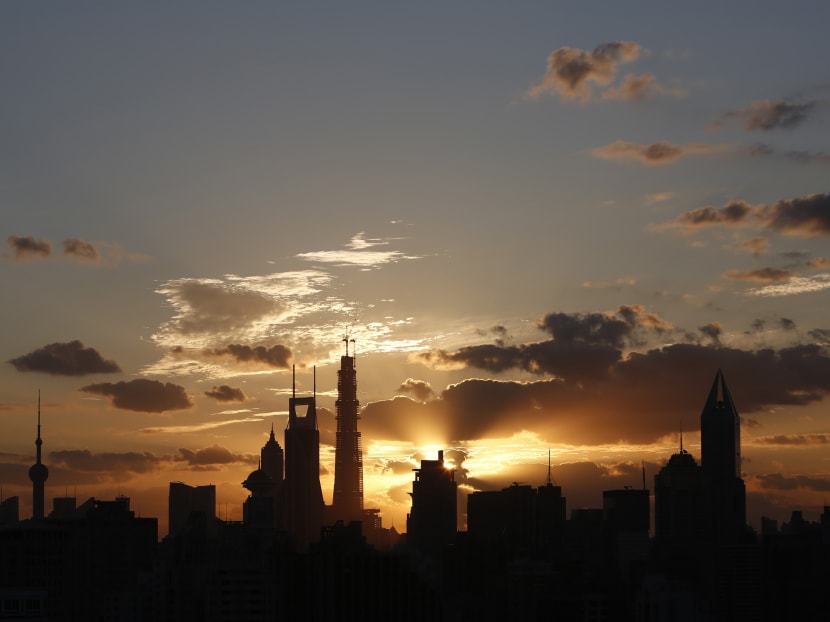Shanghai Free Trade Zone a test bed for bold financial reforms
SHANGHAI — More than three decades after Chinese paramount leader Deng Xiaoping’s experiments with capitalism in Shenzhen began lifting millions out of poverty, his successors are applying the same strategy to the tougher task of making China rich.

Shanghai will launch its trial free trade zone on Sept 29, featuring liberalised foreign exchange and interest rates in the form of new financial products. Photo: Reuters
SHANGHAI — More than three decades after Chinese paramount leader Deng Xiaoping’s experiments with capitalism in Shenzhen began lifting millions out of poverty, his successors are applying the same strategy to the tougher task of making China rich.
Reprising the role of Shenzhen is the 29 sq km China Shanghai Pilot Free Trade Zone opening tomorrow on the outskirts of the city, comprising office buildings, warehouses and concrete parking lots.
China’s State Council yesterday formally announced detailed plans for the area, saying it would use it as a test bed for bold financial reforms, including a convertible yuan and liberalised interest rates, as well as open up the sheltered services sector to foreign competition. By giving markets and the private sector a bigger economic role, China may become a high-income nation by 2030, according to the World Bank.
No specific timeline was given for implementing the reforms, though these should be carried out within two to three years, the State Council said, adding financial liberalisation may depend on adequate risk controls.
Credit Agricole economist Frances Cheung noted the cautious pace at which the liberalisation would take place, saying: “One thing that is relevant to the yuan is under Point 2, where eligible Chinese banks in the free trade zone are allowed to do offshore business, which is not the opening up of the onshore yuan market as some might have looked for.”
An executive at a foreign multinational in Shanghai said: “Is this Shenzhen 2.0 heralding the beginning of a new era in trade, or a flash in the pan to simply boost economic confidence?”
In addition to setting goals for financial services, trade and governance, the announcement details initiatives covering 18 different industries ranging from shipping and insurance to education and foreign banks.
The government hopes the free trade zone will reinvigorate the economy and help Shanghai compete with Hong Kong as a financial centre.
The opening of the Shanghai free trade zone comes ahead of a November meeting of the Communist Party’s Central Committee, at which President Xi Jinping and Premier Li Keqiang are expected to push forward more detailed economic plans. It was at such a plenary meeting in 1978 that Deng laid out his plans for reforms.
Officially established in 1980, the Shenzhen Special Economic Zone allowed foreign investors to set up factories that employed workers to make shoes, toys and electronics for export. Policies tested there were later spread nationwide, sparking a more than 97-fold expansion of China’s economy. More than 600 million people have been lifted out of poverty since, according to the United Nations.
State media announced on Thursday that China will soon join negotiations for an agreement on trade in services with the World Trade Organization, and many have speculated the Shanghai free trade zone is an opening move to position China for membership in the US-led Trans Pacific Partnership initiative.
Meanwhile, Hong Kong Chief Executive Leung Chun-ying saw no threat from the Shanghai free trade zone to Hong Kong’s position as a financial hub. “One of the most important factors is Hong Kong’s rule of law,” he said yesterday. “Hong Kong is a hub for top-notch financial professionals from both China and overseas. It also has sound supporting professionals in the legal and accounting sectors.” AGENCIES
Main reforms planned in the free trade zone
FINANCE:
* BANKING - Private capital can set up joint venture banks with foreign lenders. Chinese banks can conduct offshore business. Non-deposit banks will be permitted in the future.
* HEALTH INSURANCE - Foreign health and medical insurance institutions will be permitted to operate on a trial basis.
* FINANCIAL LEASING - Financial leasing companies operating one plane or one ship will not be subject to paid-in capital requirements. Financial leasing companies will be permitted to conduct related commercial factoring business.
TRANSPORT:
* OCEAN SHIPPING - Foreign partners will be allowed to hold larger stakes in joint venture global shipping enterprises, up from the current limit of 49 per cent.
* INTERNATIONAL SHIPPING MANAGEMENT - Foreign firms can set up solely-funded shipping management companies.
COMMERCE AND SERVICE:
* VALUE-ADDED TELECOMS - Foreign companies will be permitted to operate some specialised value-added telecommunications services. Those not meeting China’s existing laws and regulations will need special State Council permission.
* GAME MACHINES - Foreign companies can produce game machines, which they can also sell in China after approval by Chinese censors.
PROFESSIONAL SERVICES:
* LEGAL SERVICES - China will study the methodology and mechanisms for cooperation between Chinese legal offices and their foreign counterparts, as well as Hong Kong and Macau.
* CREDIT INFORMATION - Foreign companies can set up credit information firms.
* TOURISM - Joint venture tourist agencies will be allowed to conduct overseas tourist business, with the exception of Taiwan.
* HUMAN RESOURCES - Foreigners may own up to 70 per cent of joint venture recruiting firms, while Hong Kong and Macau investors can set up solely-funded recruiting firms. The requirement for paid-in capital for foreign-funded firms will be reduced to US$125,000 from US$300,000 currently.
* INVESTMENT MANAGEMENT - Foreign-funded shareholding investment companies are permitted.
CULTURAL AND SOCIAL SERVICES:
* ENTERTAINMENT VENUES - Foreigners can set up wholly-owned entertainment venues.
* EDUCATION AND TRAINING - Joint-venture educational and job-training institutions are allowed.
* MEDICAL SERVICES - Solely foreign-owned medical service institutions are allowed.





